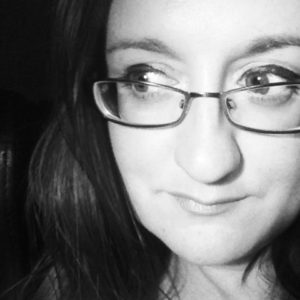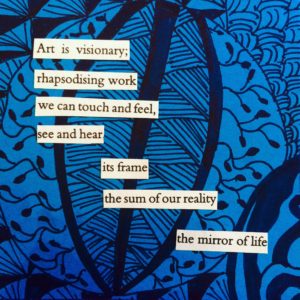 Jodi Cleghorn (@jodicleghorn) is a writer, poet, editor, small press owner and workshop facilitator with a penchant for the dark vein of humanity. Her stories (published here and overseas) traverse a variety of genres, formats and lengths, and she’s a passionate advocate of collaborative writing. Elyora/River of Bones, her debut novella, was shortlisted for an Aurealis. No Need to Reply, a flash-fiction chapbook will be followed up this month by the companion publication, The Heart is an Echo Chamber, penned by eight friends.
Jodi Cleghorn (@jodicleghorn) is a writer, poet, editor, small press owner and workshop facilitator with a penchant for the dark vein of humanity. Her stories (published here and overseas) traverse a variety of genres, formats and lengths, and she’s a passionate advocate of collaborative writing. Elyora/River of Bones, her debut novella, was shortlisted for an Aurealis. No Need to Reply, a flash-fiction chapbook will be followed up this month by the companion publication, The Heart is an Echo Chamber, penned by eight friends.
Your post-it note and cut-and-paste poetry are a consistent delight across my social media. What’s their role in your overall writing process – are they warm-ups, or important in their own right?
In short: both. They have been frivolous and serious, stop-gap play and scheduled work, disposable creativity and important self-expression. The cut-and-paste poetry gave my depression a voice in 2014, when I was coming to the realisation I was chronically ill. It morphed into poem squares and gave me the ability to keep creating/writing when my intellectual capacity for my own original work didn’t exist.
I’m a jack-of-all-words, so I am happy to be an author of science fiction sometimes, poetry builder from the texts of Winterson and Calvino other times. As long as I don’t use one to procrastinate from the other, they have the capacity to be a refueling loop.
Poem squares are important in their own right now. I sold my first one recently and plan to put more up for sale as well as open for commissions.
As an editor, your focus is on mentoring new writers (via eMergent Publishing). How did this come about, and what has your experience been with some of the more unusual projects you’ve worked on?
I embraced working with new writers for a few reasons. All were relevant to me (circa 2009), some still are.
I began editing fiction while still a relatively new writer. All my writing friends were new and they were the ones my business partner and I approached with our crazy anthology ideas. While I was helping them hone their craft, they were doing the same for me. My editing stripes were earned in the trenches of tracked changes in those early anthologies (to this day I have no formal training!). Working with new writers really pushes me as an editor (in a good way) and every story tweaks my skill set.
In the early days, it was easier to ask new writers to be part of something untried, plus collaboration is a hard gig: to hand over control of your characters and storylines, play nicely with others. I don’t think collaboration discounts experienced writers, it’s just that new writers have less to risk, more to gain.
But I’ll be brutally honest, I choose to work with new writers on the projects I do because I don’t want to read slush. To me slush is dead time. Dead energy. I prefer to invest directly: into writers, into their stories, into the community. The Neil Gaimans of the world were once new writers looking for a door to open. I’m happy to be that door, just never assume I’m a doormat.
Of all the bent and unusual projects I’ve initiated, The Yin and Yang Book (a 22-story, mated anthology set in parallel airports) still floors me—that it worked. Not just the concept, but the stories were a brilliant fit and so well written; the authors all passionately embraced the project, its structure and each other; we made deadline, all the problems we encountered along the way were solvable and we released 10 months after commencement. It was the second anthology we published and it gave me the confidence to keep pushing the buck. Literary Mix Tapes, eMergent’s music-themed anthology imprint, exists because of ‘Yandy’.
And I love Literary Mix Tapes projects for their strong community vibes. Collective submission gives a deep sense of ownership to authors in a way, I don’t think, open submission can emulate.
Your writing often centres around women, particularly mothers. What pulls you to the topic, and can we expect to see more of it?
Write what you know, right?
Motherhood in my SFF has been a relatively new addition and aligns with me gaining confidence in writing stories about reproductive rights.
I was part of the birth reform movement for years (my son was born at home in 2004) and it took time for my skills (and passion) to mature to write on topic without being preachy.
When I started writing 2007, it allowed me to transcend the grind of my everyday existence. Consequently, I didn’t want my fiction to go there. Something about what I’ve been through recently has pulled me into mother-centered stories. As was pointed out on a panel during Contact2016, we don’t see mothers in SFF stories because they are at home taking care of the kids while the action happens elsewhere. Unless a story is specifically about pregnancy, birth, breastfeeding or mothering, ‘mother’ as character and archetype is invisible. And invisibility is something I’m well acquainted with. Plus, in all honesty, writing SFF with a maternal slant makes your work a hard sell. It’s something you really have to want to write.
The challenge is to successfully pair the issues of modern mothering with something else ‘interesting’. In At Arms Length (Tincture, Issue 11), Georgie is a mother lost within her life, present but invisible to her family. When she wakes one morning without an arm, her lover is the only person who notices it missing. She worries that she’s literally traded part of her body for the happiness he brings her. So what does she do? In The Leaves no Longer Fall (At The Edge, Paper Road Press) Annabel, a widowed mother of three boys, living in a post-climate-change Australia, pays the ultimate price for her scientific discovery. Is possibly preventing the greatest humanitarian crisis the country has seen enough of a salve for her sacrifice? Here the story exists because Annabel’s a mother not because she’s a scientist.
As for the future, there is definitely more mothers and stories about reproductive rights. I’m working on a clone story, which started out as “what if there is a you to stay at home and raise the kids AND a you to go out into the corporate world”. However it’s morphed into a blackmail story and I suspect it will end up a story as much about identity, autonomy and corporate ethics as motherhood.
Encursion, my first birthpunk novella, is finally on the editing block. Once it’s done, there are seven more in the same medicratic, near-future world in a crazy-arse, massive, mosaic story that is so high-end-concept-me that my brain wants to log out and not know about it.
What Australian work have you loved recently?
The last book I read was Kim Falconer’s first full-length novel in five years, The Blood in the Beginning, (through Harlequin’s new imprint MIRA). It is a fast-faced, ultra-fun, urban fantasy with kick-ass med-student, Ava Sykes, front of page. But Ava is as fragile as she is tough, and as smart as she is lacking in common sense; brave and deeply empathetic, despite her past she’s everything I love in a female character. I read TBinB in a day. It’s been a long time since I did that. Best of all, it inspired me to return to my birthpunk world.
I’m slowly savouring Angela Slatter’s Vigil (Jo Fletcher Books). As a denizen of Brisneyland, to see my city, my haunts, in a novel, so artfully integral and beautifully described, it’s a sheer pleasure to read just for that. It’s why I loved Gary Kemble’s Skin Deep and Trent Jamieson’s Deathworks triology. There is something special, a literary homecoming, for stories you love to be set in the city you love. Vigil will forever transform the landscape of Brisbane, following in the footsteps of Trent’s books.
And speaking of Gary, his second novel, Bad Blood (Echo Publishing), is next on my to-read list. It’s been a veritable feast of Australian writing, from some of my favourite Australian writers (and friends!).
Which author (living or dead) would you most like to sit next to on a long plane trip and why?
Sitting by the window is Lauren Beukes. I met her several years ago at Brisbane Writers’ Festival when she was touring Broken Monsters. I had a fan-girl mute moment and just totally embarrassed myself when I went up to have my books signed. I want to make amends for that because she is one of my favourite authors, both content and craftwise. And she tells brilliant anecdotes. It would be a pleasure to listen to her on a long-haul trip.
And I’m in the middle seat.
By the aisle is Jeanette Winterson. She’s my author crush; serious-crush-like-I’ve-never-crushed-before crush. Since I was introduced to her work a year ago, I’ve almost read her entire back catalogue. Back-to-back. This is a first for me. I am entranced by the poetry of her language; the complexity of the concepts she plays within and the very humanness of the stories she tells. And all her books ooze with passion, as much as they do tragedy. They play equally in the shadows and sunlight, much like her personal life.
The deviant in me also loves the idea of watching the interplay between two of my favorite authors.
